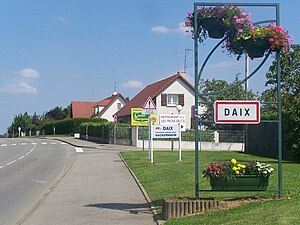Daix
| Daix | ||
|---|---|---|

|
|
|
| region | Bourgogne-Franche-Comté | |
| Department | Côte-d'Or | |
| Arrondissement | Dijon | |
| Canton | Fontaine-lès-Dijon | |
| Community association | Dijon metropolis | |
| Coordinates | 47 ° 21 ′ N , 5 ° 0 ′ E | |
| height | 290-476 m | |
| surface | 11.80 km 2 | |
| Residents | 1,471 (January 1, 2017) | |
| Population density | 125 inhabitants / km 2 | |
| Post Code | 21121 | |
| INSEE code | 21223 | |
 Entrance to Daix |
||
Daix is a French commune in the department of Côte-d'Or in the region Bourgogne Franche-Comté . It belongs to the Arrondissement of Dijon and the canton of Fontaine-lès-Dijon .
geography
The municipality of Daix with 1,471 inhabitants (January 1, 2017) is located on the north-western periphery of the city of Dijon on a high plateau above the Ouche River . To the north-west, the municipal area extends five kilometers across a hilly and wooded area that extends to the Dijon-Darois airport and has heights of over 400 m. The highest point is a lookout point at the Ferme du Chêne d'Observe at 476 m above sea level. Daix includes the districts of Bonvaux, Changey and Champ Moron . Neighboring municipalities to Daix are:
- Hauteville-lès-Dijon in the north,
- Ahuy in the northeast,
- Fontaine-lès-Dijon in the east,
- Talant in the south,
- Plombières-lès-Dijon in the southwest,
- Prenois in the west as well
- Darois in the northwest.
history
The name of the village appeared as a distrus as early as 630 . In 783 one spoke of Distrum , in 869 it became Distacium . According to these Gallo-Roman variants, the village was called Dec. 1187 . Daix appears for the first time in 1337, in 1751 the spelling changed to Deix and then returned to Daix from the end of the 18th century .
Between 1610 and 1789 Daix had eleven masters, most of them from the de Bénigne Jacquot family . In the 1630s the manoir (manor house) of this family was built in the Rue de Fontaine, of which part of the structure including the park has been preserved.
On December 14, 1789, the first municipal law was passed. Daix received its current area of 11.8 km² in 1807, when the hamlets of 1807 Bonvaux, Champmoron and Changey were incorporated.
During the Franco-Prussian War , a night battle took place on November 26, 1870 .
Population development
| year | 1962 | 1968 | 1975 | 1982 | 1990 | 1999 | 2009 | 2016 |
| Residents | 436 | 497 | 533 | 784 | 862 | 1479 | 1371 | 1439 |
Attractions
- Saint-Laurent Church, built in 1848
Economy and Infrastructure
A traditionally important branch of employment in Daix is agriculture - here in particular viticulture. The vines around Daix belong to the Burgundy wine-growing region - in particular the Bourgogne Aligoté , Bourgogne Passetoutgrain and Bourgogne Grand Ordinaire appellations . The light sparkling wine Crémant de Bourgogne is also one of the wines from Daix . Other agricultural products from Daix are cheese ( Emmental français est-central ), poultry, pork and beef and mustard ( Moutarde de Bourgogne ). The aircraft yards Finch Aircraft (construction of the popular single-engine low- wing aircraft Robin DR 400 in wood construction) and Dyn'Aéro (including production of the DynAero MCR01 ) also offer jobs . The companies use the Dijon-Darois airfield located northwest of Daix to test the aircraft. The airfield has also been used by the Aéroclub de la Côte-d'Or air sports club since 1957 . Many workers commute to the nearby city of Dijon .
Transport links
The D 971 trunk road (formerly RN 71 ) runs through Daix from Dijon via Châtillon-sur-Seine to Troyes . Other road connections lead from Daix to Hauteville-lès-Dijon and Plombières-lès-Dijon . The next motorway junction is immediately south of Daix on the A38 autoroute . There are train connections in all directions in the nearby Dijon transport hub.
Community partnerships
Daix has a partnership with Wackernheim in Rhineland-Hesse .


